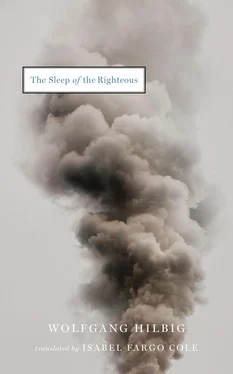One afternoon I was turned back on my way out to the mine pits: the road was blocked. A crowd of people had gathered outside the house where the Will brothers lived, but, as I saw at once, they kept a respectful distance from what was taking place. The two brothers stood in the blazing heat with their faces to the wall, behind them a Russian soldier with a machine gun, pacing up and down; another, evidently a sergeant, sat on a chair smoking cigarette after cigarette. On an empty chair on the sidewalk I saw two glittering objects: clock detonators, as the gateman later told me, time fuses for explosives; the two Wills had stolen them, no one knew quite where, and half the street was feverishly hunting for a third clock detonator whose hiding place the Wills had not clearly specified. The Russians were drinking, water or maybe vodka, while the Wills got not a drop to drink; hours later the third detonator cropped up, and the crowd dispersed.
That evening I sat alone on the curb, the town transformed in my eyes into one gigantic explosive device. What quantities of munitions might still lie in the ruins past the railroad crossing, in the bombed-out factories where they’d once been produced. . and couldn’t they blow up at any moment in this heat? — The summer brooded red above the roofs; in the east, where the mine pits lay, it was already growing dark, too soon, it seemed to me. The air that wafted from there through the street bore the leaden smell of smoking ash and smoldering rags. The heat was trapped between the houses, and the vapors seemed to cook. Inaudible tension built up at the street corners; from the side street I thought I heard the crackle of the chestnuts’ big leaves drying. Thunderclouds massed over the woods beyond the mine pits, and soon the first lightning lit the sky, followed a moment later by a ricocheting rumble, splitting into intervals of thunder, like mighty metal vats being tossed down from the heights. — But the storms over there, I knew from experience, would never reach the town; they passed the town by when they came from the east. . and I believed I knew it was the women who suffered most when the rain failed to pass over town.
Mother forbade me to swim in a thunderstorm, saying that the water attracted the lightning; she was afraid even to go near the kitchen faucet in a storm. — But I had no desire to go to the strip mines by myself anyway; all my friends had been summoned to the police station and aggressively interrogated: Did they know who on our street possessed found ordnance, and where it was hidden?. . Strangely enough, I had been left alone. And now they were home, listening to their parents’ accusations, and wouldn’t be let outside for several days. — Shortly after the incident with the clock detonators the two Wills vanished from town. But they hadn’t been sent to Siberia; the gateman told me they’d defected to West Berlin.
As every year, a week before the summer break ended Mother bought me five or six new exercise books, ten pfennigs apiece, which I’d need when school started. This time, though, I filled the notebooks before the start of the new school year, my fifth. Now I was faced with the problem of buying new notebooks myself, which I could only do if I pocketed small amounts of the change I got when sent on errands, or I would have to drum up deposit bottles to redeem at the grocery on the corner; or I could often find a few coins beneath the layer of tobacco crumbs in my grandfather’s jacket pockets. The last week before school began was routinely the dullest week of the whole year; I was all alone on the street, my friends busy, kept home by the obligation to prepare themselves for school; the water of the marsh had nearly dried up, only the beaches of the large mine pit were still bustling. I hung about in the gateman’s lodge and had him tell me stories; strictly speaking he was the most taciturn person in town, but in my presence he turned talkative. — He let me crank down the gates when a train approached, I just had to make sure the crank wasn’t wrenched from my hands. . I went outside and sounded the death knell that severed our street from the outside world. After that, as the prodigiously long coal trains passed, drawn by two locomotives yet moving no faster than a crawl, I sat at his table again, drinking grain coffee and listening to his voice, soft and hesitant as though he needed a long time to mull each sentence. He was a slim man missing his left arm; the empty sleeve was tucked into the pocket of his uniform jacket as neatly as though ironed to his body. He had lost his arm in the war to an exploding grenade, he said, and mark his words, he’d cheated death by a hair’s breadth. And those sorts, he pointed at the ruins past the railroad crossing, that lot that kept rummaging in the cellars for munitions and the like, they’d meet the same fate one day if he didn’t report them all. — What do you suppose it’s like out there? he said, though I hadn’t asked. Steppe, nothing but steppe, a hundred miles of steppe before you set eyes on a house or a village, out there in Russia. And all dried up in the heat. And then they set the steppe on fire, and the wind drives the flames toward you, you don’t know which way to run. .
For me, the Russian steppe merged with the prairie I’d read of, and the heat that hung over them was more or less the same. — And forests, I’m telling you, forests. . blunder into one, and you’ll never find your way out again. No comparison with that little copse back there! And he pointed across the strip mines, where the thunder of stagnant storms went on and on. — Everything will wither up on us if we don’t get a storm soon. .
Alone in the flat in the afternoons, I tried to write about what I’d heard. . all I managed were images with a prodigious heat looming over them. The flicker and blaze, each new daily circuit of fire through a terrain I’d dreamed up, this was almost my only subject, and I couldn’t find my way out of it. — Writing resembled swimming in this sense: once you’d gotten your head above water, once you’d started to swim, it was impossible to stop until at last you felt the sand of the far shore. In similar fashion you swam off with your words, born up by the blood-warm written words as over the surface of a mine pit smelling of coal and rot. . only that there seemed to be no far shore for these words, with the words you had to swim on and on, until the words ended by themselves, until the words themselves went under. But swimming in the words was safe, you couldn’t drown in them, you could start over with them the next day. . each afternoon, alone while the heat loomed on the street outside, while the heat on the street burned off each last little shadow, when the narrow sidewalks turned hot as stove plates for bare feet.
Men, I thought, without knowing why, could take the heat, they swam through its thoughts as through the shimmers in the air, while the women had spent half the summer lamenting the absence of storms. They were right; this August, oh, ever since mid-July, all the storms had breathed their death rattles over the woods. But women needed the rain, it seemed, only the rain, torrential showers, cloudbursts could fill them with new life. — When I lay in bed at night, sweating even beneath the single sheet, I saw them pass before me, lamenting and wringing their hands on the streets, whole processions of women with their imploring eyes turned skywards, where not the tiniest little cloud showed in the flawless blue. And only over the woods in the east did the dry thunder resound, refusing to approach the town. Before falling asleep I saw it was suddenly they who dominated the street, women no longer young, growing older and older, in their purple or black petticoats: with sunburned shoulders and upper arms they sat on the stoops and waited. . Cigarettes glowed between their fingers, and smoke rose from them, it rose in the heat that abated not even at night. I heard them murmur, sleepless beneath my window, a sleepless singsong, a sound of long-forgotten heathen incantations sent up to the sky, where the full moon hung, turning a deaf ear, white-red and immobile.
Читать дальше












